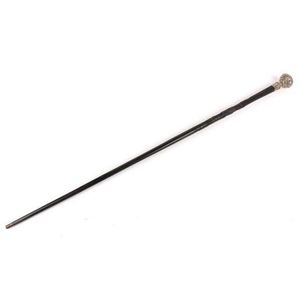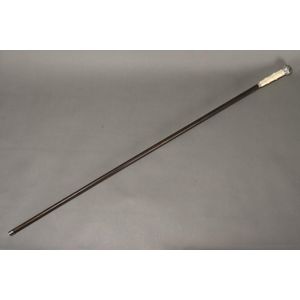Acanthus Motif Sterling Silver Walking Cane
sterling silver capped walking cane, hallmarked, of spherical form embossed with acanthus motifs, set above an ivory collar, total length 99 cm
You must be a subscriber, and be logged in to view price and dealer details.
Subscribe Now to view actual auction price for this item
When you subscribe, you have the option of setting the currency in which to display prices to $Au, $US, $NZ or Stg.
This item has been sold, and the description, image and price are for reference purposes only.
- Sterling Silver - Sterling silver is a mixture of 92.5% pure silver and 7.5% of another metal, usually copper. Fine silver is 99.9% pure silver, and is relatively soft and the addition of the very small amount of copper gives the metal enough strength and hardness to be worked into jewellery, decorative and household objects.
- Acanthus - A stylized leaf motif, one of the primary decorative elements of classical Greek and Roman architecture, derived from the genus of flowering plants in the family Acanthaceae, native to tropical and subtropical regions of the Mediterranean area. It is a common element in classical Greek and Roman design, and is often seen in Corinthian and Composite order columns and used as a decorative element in English, European and Australian furniture, particularly on the curve of a leg, and as decoration for a corbel.
- Embossed / Repousse - Embossing, also known as repousse, is the technique of decorating metal with raised designs, by pressing or beating out the design from the reverse side of the object.It is the opposite of chasing, where the decoration is applied from the front. An embossed or repoussed object may have chasing applied to finish off the design.
- Ivory - Ivory is a hard white material that comes from the tusks of elephants, mammoth, walrus and boar, or from the teeth of hippopotamus and whales. The ivory from the African elephant is the most prized source of ivory. Although the mammoth is extinct, tusks are still being unearthed in Russia and offered for sale.
Ivory has been used since the earliest times as a material for sculpture of small items, both in Europe and the east, principally China and Japan.
In Asia ivory has been carved for netsuke, seals, okimono, card cases, fan supports, animals and other figures and even as carved tusks.
In the last 200 years in Europe ivory has been used to carve figures, for elaborate tankards, snuff boxes, cane handles, embroidery and sewing accessories, in jewellery and as inlay on furniture. Its more practical uses include being used for billiard balls, buttons, and a veneers on the top of piano keys.
The use and trade of elephant ivory have become controversial because they have contributed to Due to the decline in elephant populations because of the trade in ivory, the Asian elephant was placed on Appendix One of the Convention on International Trade in Endangered Species (CITES), in 1975, and in January 1990, the African elephant was similarly listed. Under Appendix One, international trade in Asian or African elephant ivory between member countries is forbidden. Unlike trade in elephant tusks, trade in mammoth tusks is legal.
Since the invention of plastics, there have been many attempts to create an artificial ivory
This item has been included into following indexes:
-
walking sticks and canes, material
- ivory or ivory mounted 222
- silver mounted 454
- walking sticks and canes, types - walking canes 325
Visually similar items

Walking stick, late 19th century, ebony with silver top, hallmarked London, length 87 cm
Sold by
in
for
You can display prices in $Au, $US, $NZ or Stg.

Anglo Indian silver & rosewood pointer with a bone nib, length 65.5 cm
Sold by
in
for
You can display prices in $Au, $US, $NZ or Stg.

Marine ivory carved rosewood walking cane depicting a clenched fist holding a viper with a rope twist cuff. Condition good, age related wear. Length 92 cm
Sold by
in
for
You can display prices in $Au, $US, $NZ or Stg.

Walking stick, late 19th century, Irish carved bog oak, with silver top, length 91 cm
Sold by
in
for
You can display prices in $Au, $US, $NZ or Stg.
